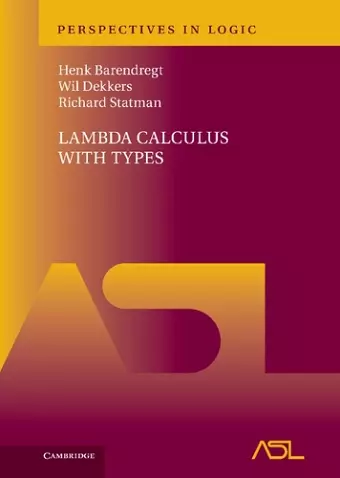Lambda Calculus with Types
Henk Barendregt author Wil Dekkers author Richard Statman author
Format:Hardback
Publisher:Cambridge University Press
Published:20th Jun '13
Currently unavailable, and unfortunately no date known when it will be back

This handbook with exercises reveals the mathematical beauty of formalisms hitherto mostly used for software and hardware design and verification.
Typed lambda calculus is used in functional programming (Haskell, Clean) and proof assistants (Coq, Isabelle, HOL), which are used to design and verify IT products and mathematical proofs. This book reveals unexpected mathematical beauty in three classes of typing: simple types, recursive types and intersection types. Numerous exercises are provided.This handbook with exercises reveals in formalisms, hitherto mainly used for hardware and software design and verification, unexpected mathematical beauty. The lambda calculus forms a prototype universal programming language, which in its untyped version is related to Lisp, and was treated in the first author's classic The Lambda Calculus (1984). The formalism has since been extended with types and used in functional programming (Haskell, Clean) and proof assistants (Coq, Isabelle, HOL), used in designing and verifying IT products and mathematical proofs. In this book, the authors focus on three classes of typing for lambda terms: simple types, recursive types and intersection types. It is in these three formalisms of terms and types that the unexpected mathematical beauty is revealed. The treatment is authoritative and comprehensive, complemented by an exhaustive bibliography, and numerous exercises are provided to deepen the readers' understanding and increase their confidence using types.
'The book has a place in undergraduate libraries because of its uniquely comprehensive, if theoretical, treatment of a timely, widely important subject. Recommended.' D. V. Feldman, Choice
'The authors have produced a well-written, organised and comprehensive account of three important type systems. These systems' properties have been rich sources of interest to logicians for many years; their problems are not all solved, and in future work this book will almost certainly become a standard reference about them. It will also allow the more mathematically inclined computer scientist to obtain a deeper understanding of the principles behind some of the higher order languages in current use.' Bulletin of the London Mathematical Society
ISBN: 9780521766142
Dimensions: 244mm x 170mm x 44mm
Weight: 1550g
856 pages